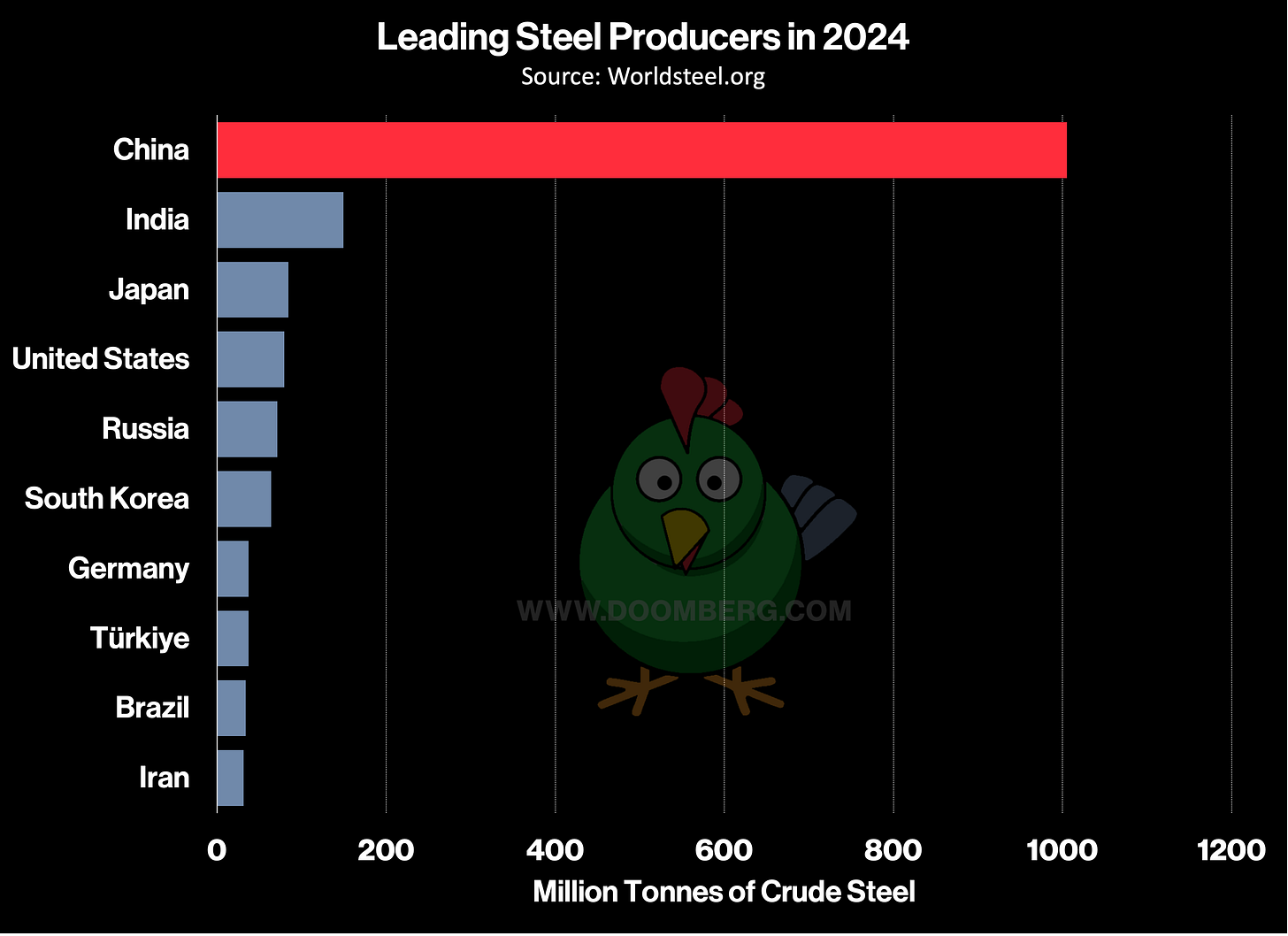Before God died and we all became the last man, men in America were brave like Worf. They embodied Klingon valor, roaring "Perhaps today is a good day to die!" into the face of oblivion, charging forward with honor intact. But in this godless twilight of complacency, where eternal recurrence yields only decay, we've traded warrior spirit for weak illusions—subsidizing solar panels that fortify our rivals while wiring our grid for self-sabotage. Ten years ago, we could have taxed solar into obscurity and banned the smart grid, safeguarding our maritime dominance. Instead, we accelerated our fade into irrelevance. Now, as China's land power eclipses us, let's unpack this depressing farce, culminating in our last, desperate gasp.
The Eternal Struggle: Land Powers vs. Maritime Empires
History is a graveyard of empires felled by geography, where the clash between land and sea powers isn't just about terrain—it's a profound ideological divide. Sea powers like the United States, with our sprawling coasts and naval supremacy, have historically flourished through open trade, the rule of law, and liberal institutions that encourage innovation and alliances. We control the seas, dictating global commerce and energy flows—oil, gas, and coal shipped across oceans under the protective umbrella of our fleet. These fuels are inherently mobile and vulnerable to blockades, but that's the double-edged sword of our strength: it fosters a system built on negotiation, contracts, and mutual dependence, where freedom of navigation underpins prosperity.
According to Mackinder, land powers—vast, inward-looking continental giants like China or Russia—gravitate toward authoritarianism, centralized control, and self-sufficiency to manage their sprawling interiors and defend against encirclement. Their resources can't be easily choked off by distant navies, breeding a fortress mentality that prioritizes state dominance over individual liberties. Solar energy maps perfectly to this land-based resilience: decentralized yet immovable, harvested from rooftops and endless deserts without reliance on vulnerable tankers or pipelines. It's the ultimate authoritarian energy—immune to external pressures, enabling total control over domestic production and distribution.
China, that sprawling continental behemoth, understood this better than we ever did. They've masterfully converted maritime energy (imported coal, oil, and gas) into land-locked solar dominance. By burning massive amounts of coal—consuming 56% of the world's output—they've fueled factories churning out photovoltaic panels at a scale that dwarfs the rest of the planet.
Coal, vulnerable to naval blockades, becomes solar panels that generate power immune to such threats. Blockade-proof energy for a land power eyeing Taiwan and beyond. We should have seen it coming a decade ago and slapped punitive taxes on solar imports to cripple their industry before it became unstoppable. Instead, we cheered "renewables" while handing them the keys to energy independence.
The Hoodwinked West: China's Coal-Fueled Solar Empire
We've been hoodwinked, as Doomberg aptly puts it, into believing China's green pivot is anything but a power grab. While the West debates forcing more Chinese-made solar panels onto our grids, Beijing builds manufacturing might on a foundation of "the dirtiest and most carbon-intensive hydrocarbon"—coal. Their solar dominance isn't altruism; it's geopolitical chess. China's installed solar capacity has surged to over 1 terawatt, with projections to reach 1.7 TW by the end of 2025—already outpacing the U.S. entire power system, which stands at about 1.2 TW across all sources. That's more solar alone than our total energy infrastructure, with a staggering 380 GW forecasted to be added this year.
The implications are nightmarish. Cheap, abundant solar juices China's factories, enabling production of high-end steel and ships at costs we can't match. Their energy edge turns into military muscle: fleets built with blockade-proof power. And semiconductors?
Demographics: The False Comfort – Why China's Population Woes Won't Save Us
In our desperation, we cling to the notion that China's demographics—its aging population and plummeting birth rates—will somehow hobble its rise, granting us a reprieve. But this is just another delusion, a false hope peddled by Western pundits. As Noah Smith argues, China's demographics will be fine through mid-century, rendering this factor irrelevant to their geopolitical and economic ascendancy.noahpinion.blog Despite the population dip starting in 2022 and a fertility rate of 1.09 (among the world's lowest, even below Japan's), there's no imminent crisis that will derail Beijing's momentum.
No demographic doom loop looms on the horizon. Warnings from outlets like The Wall Street Journal and The Economist about shrinking economies, burdensome elder care, and stifled innovation are overblown catastrophizing. China's economic powerhouse won't vanish in a puff of smoke; serious issues are postponed until the latter half of the century.
A "baby bulge" is already in the pipeline: a large cohort of young people aged 5 to 15 (the "Alphas") will enter the workforce soon, echoing the massive Millennial generation and China's historic Baby Boom (with fertility rates over 6, dwarfing the U.S.'s 3.5). This influx will boost the working-age population over the next decade, stabilizing the dependency ratio at levels akin to Japan's during its economic miracle. Only around 2050 will it worsen to match Japan's 2020 figures, buying China at least 25 years without major demographic drags—assuming no fertility rebound post-pandemic.
Even as gentle aging sets in (median age climbing from 39.5 to 50.7, with working-age decline post-2027), Beijing has tools to compensate. Raising the absurdly low retirement age (60 for men, 50-55 for women) to 65 will slash the dependency ratio and ease burdens on workers, implemented progressively. Skyrocketing college enrollment (from 26.5% in 2010 to 60.2% in 2023) will upgrade workforce productivity, as educated Alphas replace less-skilled retirees. These steps alone mitigate headwinds for the next two and a half decades, without needing extras like automation or urbanization.
On productivity and tech: While automation and AI could offset labor shortages, their impact is uncertain—aging has historically dented productivity despite tech advances. Yet, with AI evolving, future gains are possible, though not essential short-term. Immigration isn't emphasized, as internal tweaks suffice for now.
Comparisons underscore this: China's 2030 dependency ratio mirrors Japan's boom years, and it won't hit Japan's current woes until mid-century, avoiding premature "Japanification." Historical precedents, like China's outsized Baby Boom, further buffer against quick decline.
In short, demographics offer no salvation for the West. China's not crumbling under population pressures anytime soon; they're poised to dominate regardless.
The Smart Grid: A Suicide Pact with Endpoints
But energy dominance is only half the horror. Enter the smart grid—that interconnected web of "efficiency" we've naively pursued, turning our power infrastructure into a fragile house of cards. By linking every home, factory, and inverter into a vast, digital nervous system, we've exposed the entire grid to unsecured endpoints that any adversary could exploit. Even accidents spell doom: a simple software glitch could cascade through millions of devices, blacking out hospitals, igniting widespread fires, or crippling essential services for weeks. We've glimpsed the previews in cyberattacks on utilities and EMP simulations, but the true nightmare is intentional sabotage, amplified by our reliance on foreign hardware.
China, after all, manufactures the lion's share of our solar inverters—those unassuming boxes that convert DC to AC and keep the lights on. What if they're laced with hidden backdoors? A coordinated firmware update, pushed silently en masse, could activate "special modes" to disrupt frequencies, overload transmission lines, or synchronize failures in strategic regions. One encrypted command from Beijing, and the grid implodes—not from external bombs, but from an internal betrayal. The smart grid doesn't just enable this; it supercharges it, transforming decentralized solar into a de facto centralized kill switch under enemy influence. And the fallout? Catastrophic. Our military, including the vaunted nuclear deterrent, probably couldn't survive an extended grid failure. Command centers, missile silos, and submarine bases rely on stable power; backups might hold for days, but weeks or months of blackout would erode readiness, communications, and logistics. Worse, in an era where effective operations increasingly demand large AI clusters for real-time intelligence, targeting, and decision-making, those power-hungry data farms would go dark first, leaving our forces blind and outmatched. We should have banned the smart grid outright a decade ago, retreating to rugged, isolated "dumb" systems that prioritize unbreachable security over flashy connectivity. But we didn't. We integrated deeper, courting disaster. Today, it's not just a vulnerability—it's a ticking bomb buried in every American suburb, poised to unravel our defenses from the inside.
Dying with Dignity: The Nuclear Swan Song
So here we are, America: a fading maritime giant, outmaneuvered by a land power that's turned our climate zeal into their supremacy. China's solar empire, built on coal hypocrisy, powers a future where they dictate terms—from chips to ships—while we ration blackouts. Our military? Corrupt and crumbling, nukes likely duds after decades of graft. But fading away in quiet humiliation isn't our style.
Better to burn out than fade. Focus on dying with dignity: launch everything we've got at China on the way out. Sure, most missiles might fizzle like our overpriced F-35s, but the attempt matters. A final, defiant blaze against the encroaching dark. Because in this depressing saga, surrender isn't an option—only the catharsis of mutually assured destruction, however improbable.
We've been hoodwinked, outbuilt, and outsmarted. Ten years too late for taxes or bans. All that's left is the fallout.







